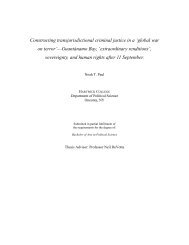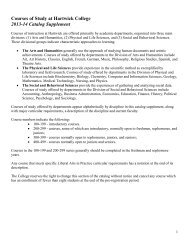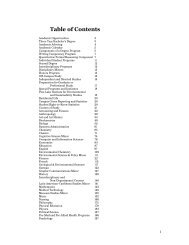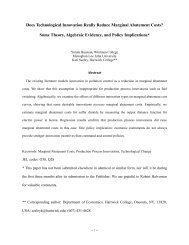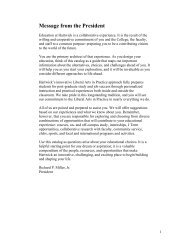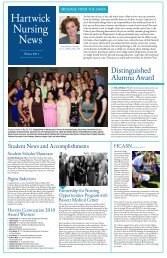Table of Contents - Hartwick College
Table of Contents - Hartwick College
Table of Contents - Hartwick College
You also want an ePaper? Increase the reach of your titles
YUMPU automatically turns print PDFs into web optimized ePapers that Google loves.
Philosophy<br />
“Philosophy” literally means “love <strong>of</strong> wisdom.” It denotes a kind <strong>of</strong> activity<br />
rather than a kind <strong>of</strong> subject matter; as contemporary philosophers use<br />
the term, philosophy is a kind <strong>of</strong> reflection on and analysis <strong>of</strong> various<br />
other human activities. For example, philosophical analysis distinguishes<br />
between moral, religious and scientific discourse and reflects on how<br />
religion is related to morals on the one hand, and to science on the other.<br />
Philosophy dates back to the ancient Greeks, when Socrates, Plato,<br />
Aristotle and other thinkers explored the nature <strong>of</strong> reality and the means<br />
by which people come to know. Later philosophers such as Descartes,<br />
Hume and Kant refined the understanding <strong>of</strong> human existence. The study<br />
<strong>of</strong> philosophy challenges students to examine very fundamental questions<br />
and, in so doing, better prepares them for life. As they become familiar<br />
with the teachings <strong>of</strong> the world’s great philosophers, students also develop<br />
their ability to examine, clarify, analyze—and care for— the natural and<br />
human worlds.<br />
<strong>Hartwick</strong>’s philosophy program acquaints students with issues <strong>of</strong><br />
contemporary philosophical inquiry, as well as the thinking <strong>of</strong> important<br />
philosophers <strong>of</strong> the past. Major areas <strong>of</strong> study include epistemology, the<br />
study <strong>of</strong> how we come to know and <strong>of</strong> the limits <strong>of</strong> what we can know;<br />
metaphysics, the study <strong>of</strong> reality; and ethics, the study <strong>of</strong> moral standards<br />
and value theories. Departmental <strong>of</strong>ferings include courses in the history<br />
<strong>of</strong> philosophy as well as systematic courses, which introduce students to<br />
the chief areas and topics <strong>of</strong> philosophical investigation. These courses,<br />
together with opportunities for directed individual study, permit students<br />
to do advanced and specialized work in philosophy and to develop<br />
competence in handling philosophical problems.<br />
Students who major in philosophy complete core courses in logic, history<br />
<strong>of</strong> philosophy, ancient and modern philosophy, and ethics. Additional<br />
courses in philosophy selected to complete the major requirements<br />
depend on a student’s interests and future career goals. The major<br />
program culminates in a baccalaureate thesis, a directed study, in an area<br />
<strong>of</strong> philosophical inquiry.<br />
Graduates with a major in philosophy have many options. Those with<br />
demonstrated ability who desire to continue in the field may do graduate<br />
study in philosophy to prepare for college teaching. Students who have<br />
majored in philosophy as undergraduates also may pursue graduate study<br />
in other fields; philosophy is a recommended major for students<br />
considering law school, for example.<br />
Faculty<br />
Stanley Konecky, chair; Adrian Kuzminski; Adrian McFarlane; Stefanie<br />
Rocknak<br />
Courses<br />
191



